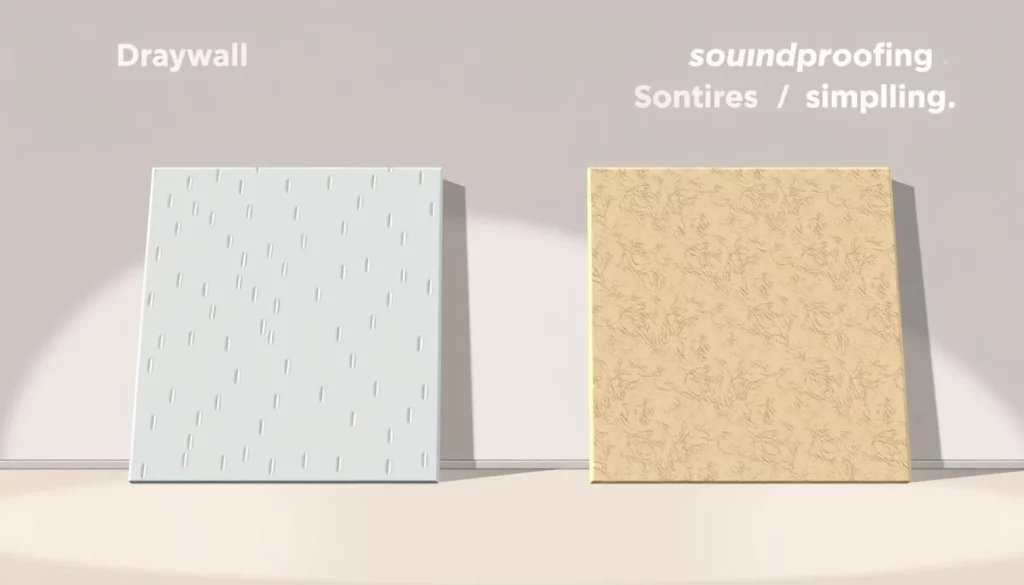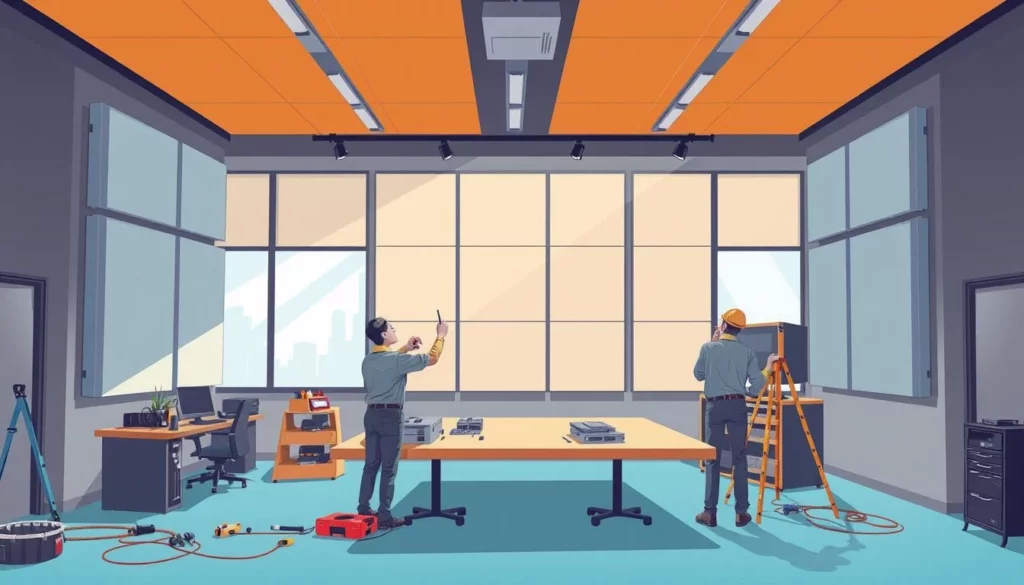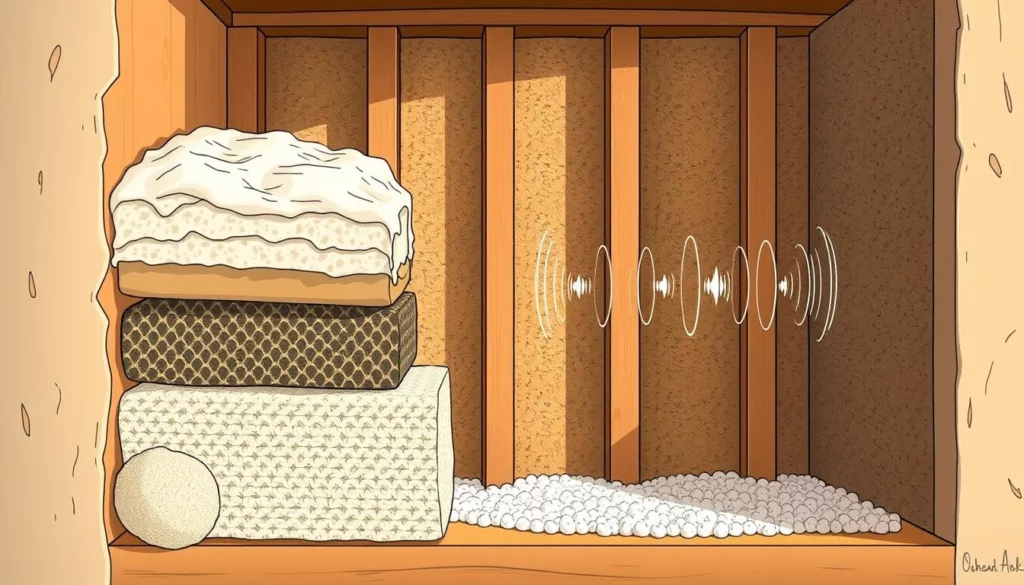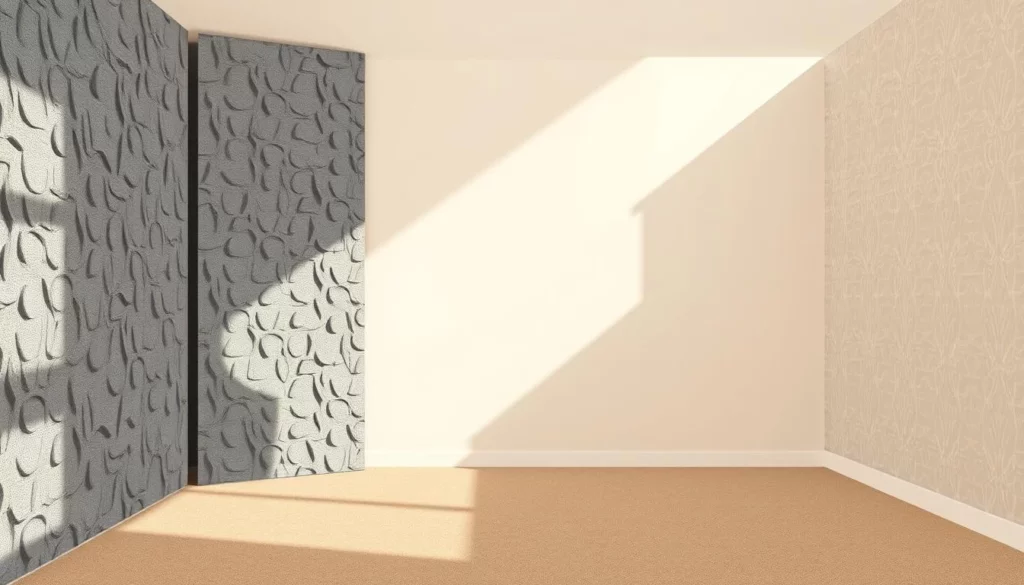Choosing the right drywall for soundproofing is key to a peaceful home. It makes your space more comfortable and can raise your home’s value. Whether it’s for a professional studio or a cozy living room, finding the right solution matters. There are many drywall types, from affordable to top-notch like QuietRock, that help you meet your goals.
Understanding Soundproofing Basics
Soundproofing helps control unwanted noise, making a peaceful living environment. By using soundproofing materials, noise entering or exiting a space is cut down.
What is Soundproofing?
It uses soundproofing materials to lessen or stop sound between spaces. This is great in homes to reduce outdoor and indoor noise.
Importance of Soundproofing in Homes
The importance of soundproofing in homes is huge. It boosts privacy, comfort, and makes living better. It keeps peace at home, making activities like working or watching movies enjoyable.
Types of Drywall for Soundproofing
Looking at soundproofing drywall for your home requires knowing the options out there. You’ll find big differences in how they’re built and how well they block sound between standard and soundproof drywall.
Standard vs. Soundproof Drywall
Standard drywall is what you see in most buildings. It’s made from a single gypsum layer. But, it doesn’t really cut down on noise much. On the other hand, soundproof types like QuietRock use several layers.
These extra layers include gypsum and viscoelastic parts. They work together to better block sound.
Specialty Drywall Options
There’s more than just basic soundproof drywall. You can find specialty ones like acoustic drywall too. These use cutting-edge methods and materials to soak up even more noise. Picking the best one for your needs can really affect how quiet your house is.
Knowing these differences helps you choose wisely. It leads to a more peaceful and enjoyable home.
The Role of Density in Soundproofing
Density plays a big part in soundproofing your space. The denser something is, the better it blocks sounds. This helps make homes and workplaces quieter and more comfortable.
How Density Affects Sound Transmission
Density is key in stopping sound. Heavier materials are better at absorbing and blocking noise. For example, thicker gypsum boards cut down on sound more than standard drywall. In short, the denser the material, the quieter your space.
Recommendations for Dense Materials
Look for materials like composite for soundproofing. In homes, thick gypsum boards are great. For businesses, concrete or heavy composite panels work best. Below is how effective different materials are:
| Material | Density (kg/m³) | Effectiveness in Soundproofing |
|---|---|---|
| Standard Drywall | 800 | Moderate |
| Thick Gypsum Boards | 1200 | High |
| Composite Panels | 1500 | Very High |
| Concrete | 2400 | Exceptional |
Picking dense materials enhances soundproofing and building strength. Remember density’s importance in your soundproofing plans.
Acoustic Treatments vs. Drywall Solutions
Choosing between acoustic treatments and drywall solutions is key for your home’s soundproofing. Each has benefits fitting various needs. Knowing which to choose can greatly affect your soundproofing’s effectiveness.
When to Use Acoustic Panels
Acoustic panels are great for absorbing sound in places like music studios and home theaters. They help reduce echoes and make sound clearer. They’re also easier to install than drywall solutions, helping those who rent or need a fast solution.
Combining Drywall with Acoustic Solutions
For the best soundproofing, think about mixing solutions. Using dense drywall and acoustic panels together improves noise isolation. This way, sound from both inside and outside can be controlled, making a quieter space.
Here’s a quick guide to help decide:
| Feature | Acoustic Panels | Drywall Solutions |
|---|---|---|
| Primary Function | Sound Absorption | Sound Blocking |
| Installation Flexibility | High | Moderate |
| Cost | Varies | Moderate to High |
| Ideal Settings | Studios, Theaters | Residential, Office Spaces |
Knowing how acoustic treatments and drywall solutions work is important for soundproofing. Combining both methods often brings the best outcome. This way, your space can absorb and block noise well.
Installation Considerations for Soundproof Drywall
Installing soundproof drywall needs careful attention to work best. It’s important to follow the right steps and watch out for mistakes. Doing this well can really make a difference in how quiet your room is.
Proper Techniques for Installation
One top soundproofing installation tip is using decoupling. This means creating a gap between the drywall and the wall itself, which stops sound vibrations. Also, using resilient channels helps block noise even more. It’s also key to use special drywall screws made for soundproofing to get the best installation.
Common Mistakes to Avoid
When installing soundproof drywall, don’t let there be gaps between panels. Such gaps can make the soundproofing much less effective. Make sure to seal the joints well with acoustic sealant, too. Not aligning panels right or not using enough screws can also ruin your soundproofing efforts.
Cost Analysis of Soundproof Drywall
Starting a soundproofing project means knowing the cost of soundproof drywall is key. Specialized soundproof types cost more than regular drywall at first. Yet, looking at these costs versus the long-term benefits shows the true value.
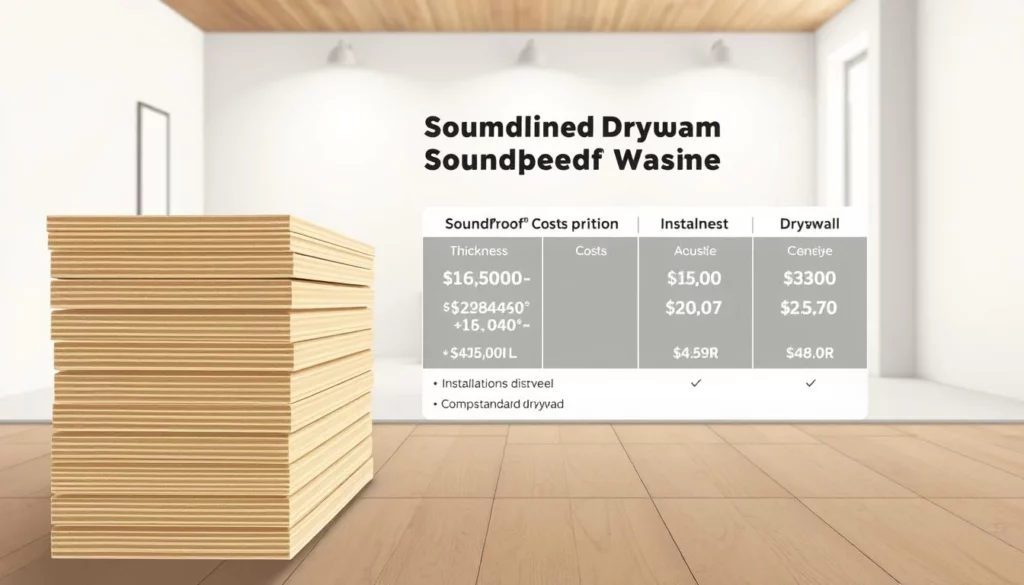
Comparing Costs of Different Types
Analysis of soundproofing cost shows an extra layer of normal drywall seems cheaper initially. But, extra labor and its less effectiveness could make it more expensive in the end. On the other hand, specialized soundproof drywall, although more costly, reduces noise better and doesn’t need fixing as often.
| Drywall Type | Initial Cost per Square Foot | Installation Ease | Long-term Benefits |
|---|---|---|---|
| Standard Drywall | $0.40 – $0.65 | Easy | None |
| Extra Layer Standard Drywall | $0.80 – $1.30 | Moderate | Moderate |
| Specialized Soundproof Drywall | $1.40 – $2.25 | Challenging | High |
Evaluating Long-term Investment Value
A thorough soundproofing cost analysis proves that quality pays off. High-quality soundproof drywall cuts down noise and could raise your home’s value. Even though it’s more expensive at first, the quiet and durability make it a smart choice.
Additional Soundproofing Materials
Adding more soundproofing materials to your drywall can make a big difference. These materials work with drywall to control sound better.
Insulation Options to Pair with Drywall
Fiberglass and rock wool are top choices for soundproofing insulation. Fiberglass traps sound waves well, making it harder for noise to get through walls. Rock wool also provides great sound and heat control. Together with drywall, they form a strong defense against noise.
Sealants and Their Importance in Soundproofing
Sealants play a key role in soundproofing. They fill in wall gaps and around fixtures, stopping sound leaks. Acoustic sealants are easy to use and crucial for a soundproof system. Using sealants with insulation and drywall is key for the best sound reduction.
Comparing Performance Ratings of Soundproof Drywall
Choosing the right soundproof drywall is important. The Sound Transmission Class (STC) rating measures its effectiveness. It shows how well the drywall blocks sound from passing through.
STC Ratings Explained
STC ratings tell us how good a material is at reducing sound. The higher the STC rating, the better it soundproofs. Regular drywall’s STC rating ranges from 30 to 34. But soundproof drywall can go over 50. This makes a big difference in sound isolation.
A high STC rating means less noise gets through. An STC rating of 50 turns loud speech into just a murmur. This creates a quieter space and better privacy.
Choosing Based on STC Ratings
Think about the needs of your space when picking soundproof drywall. For homes, higher STC-rated drywall is great for bedrooms or offices. Each commercial space has its own sound control needs.
The table below shows different STC ratings and how they perform:
| STC Rating | Soundproofing Performance |
|---|---|
| 30-34 | Minimal sound control; normal conversation can be easily heard |
| 35-39 | Moderate sound control; loud speech can be heard but not understood |
| 40-44 | Good sound control; loud speech can be faintly heard but not understood |
| 45-49 | Excellent sound control; loud speech is almost inaudible |
| 50+ | Superior sound control; loud sounds are barely perceptible |
By knowing STC ratings, you can pick the best soundproof drywall. This ensures your home or office stays quieter.
DIY vs. Professional Installation
Choosing between DIY and professional soundproofing can greatly affect your home’s quietness. Both options have pros and cons to think about.
Pros and Cons of DIY Project
DIY soundproofing is great for those who like doing projects themselves and learning new things. You can save money and work on it whenever you want. But there are downsides. Doing it yourself takes time and not having the right tools or know-how can mean it won’t work as well. Also, if you make mistakes, you might have to spend more to fix them.
When to Hire Professionals
Hiring professionals is best for tricky projects or when special skills are needed. For example, when you have to put in special drywall or fix part of your house’s structure. They have the tools and knowledge to get the job done right. Plus, they can spot and fix problems quickly, saving you time and preventing expensive errors. Even though it costs more upfront, having a pro do it means better and lasting results.
Final Thoughts on Soundproofing Your Home
Soundproofing your home boosts both comfort and value. It involves choosing the right drywall, understanding density, and using insulation and sealants. You should think about DIY versus hiring pros for the best outcome. Looking at costs and future benefits helps you pick the right soundproofing.
Making the Right Choice for Your Needs
When picking soundproofing options, think about the noise type, which rooms need it, and your budget. For minor noise, standard drywall might work. But for more noise, high-density drywall with insulation and sealants is better. The best approach often mixes several materials and methods.
Future Trends in Soundproofing Technology
The future of soundproofing looks bright with new, efficient options coming. We’ll see materials with nanotechnology and smart systems that cancel noise better. These will perform better at noise reduction, be eco-friendly, and more cost-effective. Keeping up with these trends ensures your choices are both current and forward-looking.
